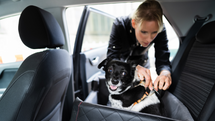Why You Should Consider Adopting a Senior Dog

Adopting a dog is a beautiful act of kindness, and choosing to bring a senior dog into your life may be one of the kindest decisions of all. If you’re visiting shelters or browsing rescue listings, take a moment to consider the dogs beyond the puppy stage, they could be waiting for you to change their world.
The Unique Joys of Adopting a Senior Dog?
What Qualifies as a “Senior” Dog?
"Senior" status depends on the breed and size. Smaller breeds often age more slowly, while giant breeds might reach seniority as early as five years old. Typically, most dogs are considered seniors around age 7 or 8. In shelters, determining exact ages can be challenging, but a little grey around the muzzle, worn down teeth or a gentler energy level often indicates they’re in their golden years.
Why Do Senior Dogs End Up in Shelters?
Many older dogs find themselves in shelters through no fault of their own. Common reasons include:
- The passing of their original owner
- Change in family dynamics
- A move to a pet-free residence
- Financial or health issues that prevent their care
- Getting lost and ending up labelled as “strays”
None of these factors reflect the dog’s character or potential for love. In fact, adopting a senior dog means giving a second chance to a loyal companion who might otherwise be overlooked.
The Many Benefits of Choosing a Senior Dog

There are many good reasons to choose a senior dog when looking for a new companion. Sure, they don’t have that puppy bounce anymore, but then, they don’t have that puppy bounce, so you won’t be chasing them around or picking up all the things that they have knocked over or discovering your favourite shoe chewed.
1. Ready for Love and Grateful for a Home
Older dogs may not have the boundless energy of puppies, but they are brimming with affection. Many know their chances of adoption are slimmer, so when they do find a forever home, they show immense gratitude and often bond quickly and deeply with their new family.
2. You Could Be Their Last Hope
Puppies are always in high demand, often leaving senior dogs overlooked. Even in no-kill shelters, older dogs tend to wait much longer, experiencing stress and trauma that can impact their health. By choosing a senior dog, you’re giving them the love, security, and dignity they deserve.
3. What You See is What You Get
With a senior dog, you know their full-grown size and personality from day one. This eliminates the mystery and surprises that can come with adopting a puppy, especially if they’re a mixed breed.
4. Calm, Comfortable Companions
Older dogs are more settled, which is ideal if you have a busy schedule. They sleep more and need less exercise, which is perfect for busy owners or apartment living. Senior dogs are past their “teething” phase, so you’re less likely to come home to chaos.
5. House-Trained and Ready to Go
Many senior dogs have been house-trained for years, so they adapt quickly to their new environment. While there may be some adjustment, especially at first, most senior dogs quickly settle into a new routine with minimal accidents.
6. Often Already Trained
Senior dogs often come with basic obedience skills, and many already know leash manners and a few tricks. even if they didn't learn any commands from their previous owners, the time spent in the shelter likely taught them a thing or two! You may only need to refresh these skills rather than starting from scratch.
7. Social and Well-Mannered
Senior dogs tend to be more socially mature. They’re less likely to jump on guests or nip playfully, making them an ideal choice for families with kids, seniors themselves or those looking for a calmer pet.
8. Easier to Integrate with Other Pets
If you have other pets, a senior dog may be more accepting and adaptable. With a meet-and-greet, you can get a good sense of how they’ll interact with your existing furry family members.
Things to be aware of when viewing older dogs for adoption

While senior dogs bring countless advantages, a few factors require thoughtful consideration.
1. Observe Behaviour and Habits
Some senior dogs may have developed certain habits due to lack of training or neglect. While many issues are manageable, talk to the shelter about any known behaviour patterns, and be prepared for a bit of patience and training.
2. Health and Mobility
Some senior dogs might struggle with mobility due to joint issues. However, a healthy diet, exercise, and medication can often improve their quality of life. A vet can help you create a plan to keep your dog comfortable.
3. Compatibility with Kids and Other Pets
If the dog has shown aggression toward children or cats, it’s challenging to retrain them at this age. Discuss these concerns with shelter staff to ensure the dog will be a good match for your household.
4. Medical Needs
Senior dogs may have health issues that require regular vet care. Consider if you’re ready to support their medical needs to give them a happy, comfortable life.
Give an old dog a new chance
Senior dogs are often overlooked by families, who leave them behind for younger dogs. But if you choose a senior companion, they’ll be overjoyed to join you, grateful for the love and attention they’ve longed for.
Once home, make sure you provide everything they need for a healthy and happy life. Petzyo offers a range of nourishing kibble and healthy dental chews, to support your senior dog’s well-being. Whether it’s our Kibble That Counts or Raw Royalty range, you can find options that promote dental health, joint support, and essential nutrients to keep your senior dog active and thriving. Choose Petzyo to help give your senior companion their best life yet.


![Can Dogs Eat Cauliflower Raw or Cooked? [Aussie Dog Nutrition Guide]](http://petzyo.com.au/cdn/shop/articles/dog_staring_at_whole_cauliflower_on_his_side_5684da82-535b-45a8-b897-3004487976bc.jpg?v=1767953483&width=1024)



